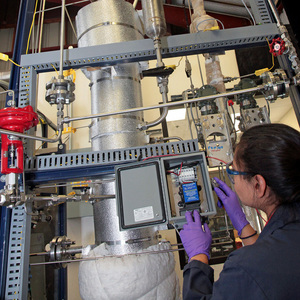SwRI adds custom-designed circulating fluidized bed system




Southwest Research Institute
September 8, 2014
BY Southwest Research Institute
Southwest Research Institute has announced the addition of a custom-designed circulating fluidized bed (CFB) to convert heavy crude oils or biological feedstock such as corn, into valuable, refined fuel samples that clients can assess for quality and profitability. SwRI’s system produces samples at about a half liter per hour, allowing more tests to be run in a shorter time.
The 15 foot tall, 150 square foot CFB is in operation and available to respond to the current push for biofuels, which require catalyst-aided processing of raw materials, or feedstock, derived from biological materials such as algae, corn or wood, or from refinery products such as heavy crude oil. Clients can use a CFB to evaluate new catalysts and determine how plant-derived, bio feedstocks and bio-oils can be efficiently integrated into refineries.
Advertisement
The CFB system converts biomass, material derived from plants or wood, to organic liquids using fast pyrolysis, a thermal conversion of organic material in the absence of oxygen. It also can emulate a fluidized catalytic cracking (FCC) unit, a refinery process to convert complex hydrogen molecules to simpler molecules, to convert lower-valued feedstock to higher-value products such as gasoline or diesel. For example, fluidized cataltyic cracking is commonly used in producing gasoline from crude oil.
SwRI’s new circulating fluidized bed is flexible in operation to test both fast pyrolysis processes for biomass-to-biofuels conversion technologies and FCC refinery unit operations.
“In the U.S., a pilot-sized CFB such as ours is unique since conventional FCC testing equipment is smaller and produces very small quantities of material for testing,” said Eloy Flores, an assistant manager in the fuels and energy development section in SwRI’s chemistry and chemical engineering division. “We can produce enough material for fuel specification or standardized testing. In addition, we are capable of high riser velocities associated with biomass fast pyrolysis.”
Advertisement
SwRI has extensive experience working with unconventional feedstocks and converting them to jet, gasoline and diesel specification fuels. SwRI also evaluates these fuels to determine operation conditions, the feasibility of refinery hydrotreaters (a process for reducing contaminants in the fuels), and to certify biofuels for on-road use through emissions testing.
Related Stories
The U.S. Department of Energy Bioenergy Technologies Office (BETO) announced up to $23 million in funding to support research and development (R&D) of domestic chemicals and fuels from biomass and waste resources.
The U.S. DOE has announced its intent to issue funding to support high-impact research and development (R&D) projects in two priority areas: sustainable propane and renewable chemicals and algal system cultivation and preprocessing.
Sens. Sherrod Brown, D-Ohio, and Pete Ricketts, R-Neb., in August introduced the Renewable Chemicals Act, a bill that aims to create a tax credit to support the production of biobased chemicals.
The Chemical Catalysis for Bioenergy Consortium, a consortium of the U.S. DOE’s Bioenergy Technologies Office, has launched an effort that aims to gather community input on the development of new biomass processing facilities.
USDA on March 8 celebrated the second annual National Biobased Products Day, a celebration to raise public awareness of biobased products, their benefits and their contributions to the U.S. economy and rural communities.
Upcoming Events










